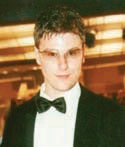DM MEETS THE MANN

Interview with Miami Vice director Michael Mann
DM: "Thief, Heat, Collateral... your previous works have all heavily chronicled both sides of the law. In this, you shift that focus back onto the detectives. There's not much of that 'other side of the coin' perspective which is so prevalent in your previous films. Was that a conscious decision?"

Interview with Miami Vice director Michael Mann
DM: "Thief, Heat, Collateral... your previous works have all heavily chronicled both sides of the law. In this, you shift that focus back onto the detectives. There's not much of that 'other side of the coin' perspective which is so prevalent in your previous films. Was that a conscious decision?"
MM: "That's a great question. The original Vice series wasn't very sympathetic - if that's the right word - to the criminals. And that was definitely one aspect we wanted to transport into the movie. The other factor is that Tubbs and Crockett are themselves fully imperfect characters who already embody both sides of the law. With there being two of them, I felt it would be a distraction more than an insight to be thorough about the back-stories of who they were up against on this one. I think a lot of this movie is about two detectives trying to do the right thing whilst being surrounded by all the wrong things, and the constant temptation which comes with that."
DM: "In the original Heat script, adapted from your earlier movie, LA Takedown, you had a scene where Al Pacino's character, Vincent Hanna, snorts cocaine in a nightclub. If I'm correct, that was removed from the script before filming commenced, presumably to preserve the virtue of the character. These two characters feel like young Vincent Hanna's who weren't as disciplined even if no less dedicated. How much of an influence, if any, was that character on Crockett and Tubbs."
MM: "These two certainly have Hanna's dedication, no doubt. But I think where they differ - going back to your earlier point earlier - is that in Heat we contrast that dedication against the commitment of a counterpart. What I thought would be interesting in Vice would be to show these guys imbedded in the world they operate in. Vincent Hanna goes home to his wife and step-daughter each night, and takes his world into theirs because he's so dedicated he can't escape it even when he's removed from it. These [Crockett and Tubbs] detectives have no home to go. This world is their home, and they risk being dragged deeper into it the longer they live there. We did have a few scenes I thought about putting in there to go deeper into Crockett and Tubbs' back-stories, but it didn't make sense to in the end because I wanted to keep that air of mystery about the characters. You never know what these guys are going to do next, and I think that for most of the movie they're still figuring that out themselves as characters. They don't have the surety of Vincent Hanna, but they definitely have the composure to carry out the choices they make."
DM: "You were involved with the original Miami Vice TV series back in the 80's; what made you wait so long before adapting Vice for the big-screen?"
MM: "I don’t have to tell you that near-on 20-years is a long, long time so perceptions and premises change somewhere along the line. I knew it needed to be updated to a contemporary story and setting, I knew the old format wouldn’t translate, so what we ended up with was a little bit of the old and a lot of the new. I think, considering the whole time thing, this was what a Miami Vice movie was always going to have to be like."
DM: "Did you ever start to think you’d waited too long to resurrect interest in something like Vice, especially given that the current era might not harbour the same exclusive tastes of the original series?"
MM: "Oh, it was difficult. I think that was the whole reason for needing to change it. You’re absolutely right, people’s tastes change. A lot of people still love the series, but I’d been wanting to update it for some time, working on the script privately for a long time, too. The biggest thing though was to find the right people; two first-rate, young actors who were up to the job. They honestly don’t come much better than Jamie and Colin so as soon as I had them on board and a draft of the script I was happy with I knew it was finally time to do it."
DM: "Knowing you as a career perfectionist, were you satisfied with the end result?"
MM: "I’m glad it’s over and done with. It’s always nice to just be able to do this part, the fun part, enjoy the memory of it. I guess I’m happy with the final cut but ultimately it’s about what everybody else thinks of it. What did you think of it?"
I’ll leave you to answer that one for yourselves.
© David Mahmoudieh 2006


0 Comments:
Post a Comment
<< Home